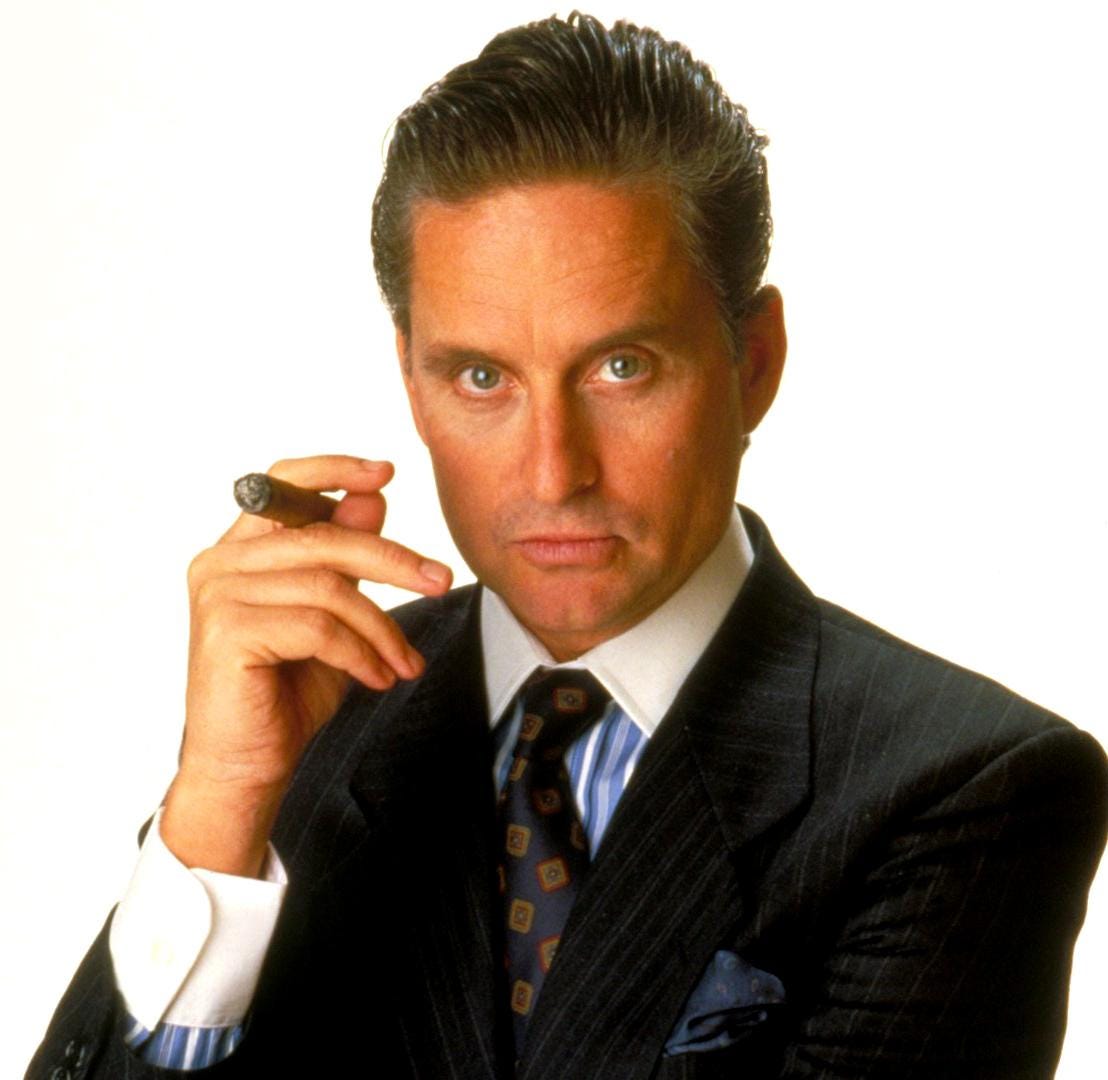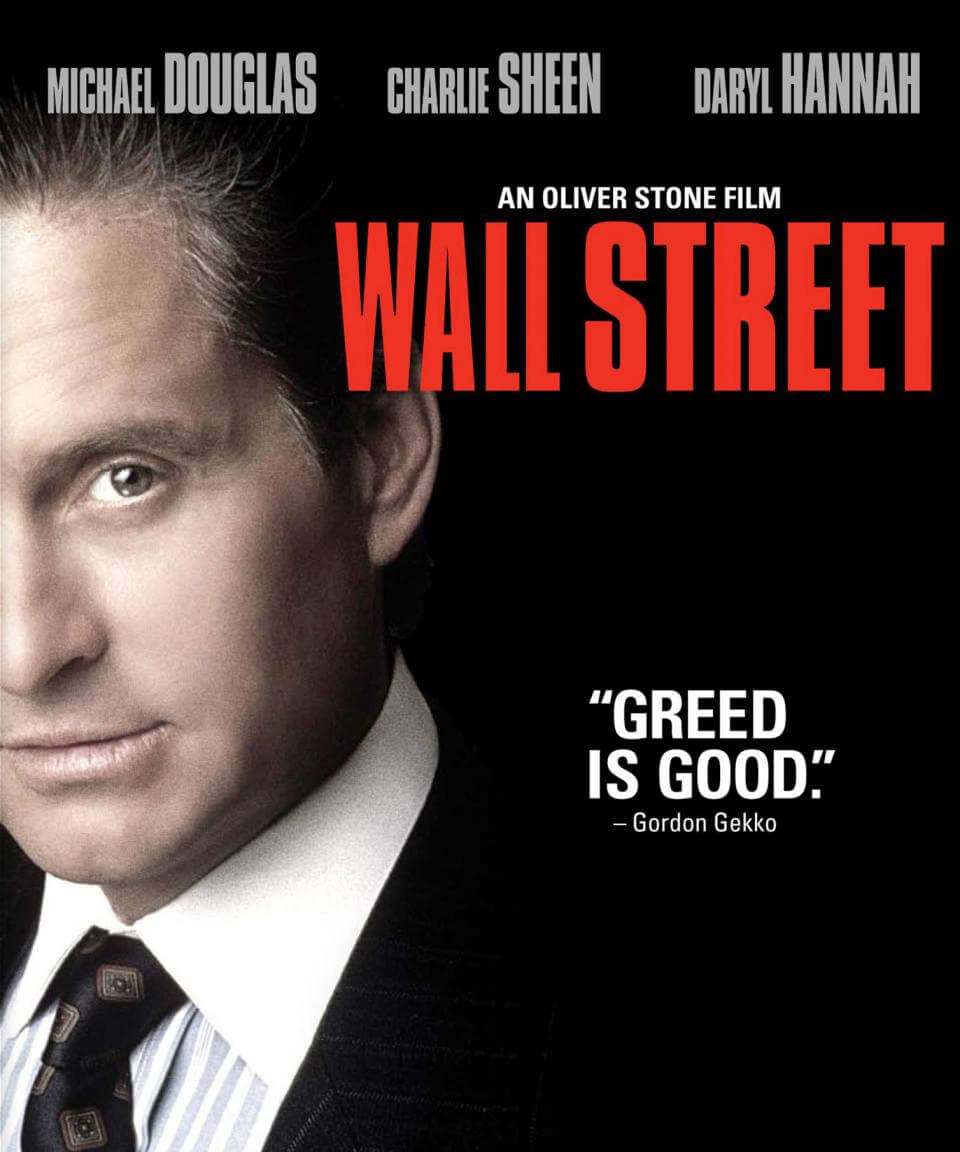Is Greed Good? Exploring The Legacy Of Gordon Gekko
"Greed is good"? Unmask Wall Street's most iconic villain, gordon gekko, & explore his lasting impact on wealth, morals & movies.
Author:James PierceReviewer:Emily SanchezJan 25, 20242.4K Shares112.8K Views

Imagine scrolling through your social media feed, bombarded by perfectly curated vacations, designer outfits, and envy-inducing glimpses of lavish lifestyles. A pang of dissatisfaction creeps in, whispering: "What if I could have that too?" You close the app, but the seed of desire is planted. Suddenly, a quote echoes in your mind, uttered by a man with slicked-back hair and a predatory smile: "Greed, for lack of a better word, is good." This isGordon GekkoWall Street's most infamous icon, and his infamous mantra "Greed is good" continues to reverberate decades after it first graced the silver screen.
Gekko, the ruthless corporate raider of Oliver Stone's 1987 film "Wall Street," became an instant symbol of excess and avarice. His philosophy, built on the pursuit of wealth at any cost, has sparked endless debate. Is Gekko's unbridled ambition a path to success, or a recipe for self-destruction? Does the allure of "having it all" justify the ethical compromises it often demands?
In this deep dive, we'll peel back the layers of Gekko's legacy, exploring the dark underbelly of his "greed is good" philosophy. We'll dissect the psychological allure of wealth and power while examining the human and societal costs of unchecked ambition. Through iconic scenes, compelling arguments, and relatable anecdotes, we'll embark on a journey to answer the ultimate question: Is Gekko's greed a siren song of success, or a cautionary tale for our times?
Gordon Gekko - The Master Of Wall Street Greed
Rise To Power - A Predator In Pinstripes
Gekko's ascent is paved with ruthless brilliance. He's a master of hostile takeovers, stripping companies bare like a lion devouring its prey. Remember that iconic scene in "Wall Street" where he gleefully dismantles Bluestar Airlines, leaving a trail of broken promises and shattered lives in his wake? He feasts on fear, exploiting loopholes and insider information to manipulate the market like a puppet master pulling strings. His weapon of choice? Words. He spins silver into gold, weaving tales of prosperity and growth that mesmerize investors and blind them to the human cost of his games.
"The money isn't everything, it's the only thing," he declares, a mantra that chills with its cold pragmatism. He flaunts his wealth with obscene displays of opulence, a pied piper leading a parade of envy and misplaced admiration. His charm is undeniable—a carefully crafted veneer that masks a ruthless predator. Every smirk, every calculated pause in his speech, is a calculated play to disarm and manipulate.
Morality In The Jungle - Where Ethics Die On Wall Street
A moral wasteland exists beneath the surface. Actions by Gekko are catastrophic. Broken lives, families, and livelihoods are blown away. The 2008 financial crisis, which echoed Gekko's attitude, demonstrated the human cost of greed.
Critics see him as a capitalist villain who represents everything wrong. They point to his inequalities, environmental degradation, and preoccupation with wealth. When twisted and overused, his comments galvanize those who see Gekko as the harbinger of social collapse.
But is he evil? Some see a grim portrayal of our hidden need for "more." His harshness, albeit unpleasant, is a misinterpretation of the American Dream. Where do ambition and greed intersect? He pushes morals. Who can succeed without sacrificing something?
Gekko's legacy is a cautionary tale hidden in prosperity. He symbolizes Wall Street's evil side, showing that money can be costly. He also represents our ambitions and morality. Gordon Gekko's strength as a symbol and his timeless issues about greed, morality, and the price of success in the modern world have imprinted on our collective consciousness, whether we view him as a villain or a cautionary figure.
"Greed Is Good" - Deconstructing The Mantra
The Allure Of Success - The Siren Song Of Gekko's Domain
Gekko's mantra isn't just a catchy phrase; it's a siren song that tugs at the primal desire within us, the craving for success, recognition, and power. His opulent lifestyle, a glittering mirage of mansions, yachts, and designer suits, whispers promises of fulfillment and a life beyond our wildest dreams.
Remember that scene in "Wall Street" where Gekko throws wads of cash in the air on a crowded beach? It's an exaggerated symbol of the kind of instant gratification his philosophy promises. It speaks to the part of us that wants the shortcut, the magic formula that bypasses hard work and catapults us straight to the top.
The American Dream And The Hunger For More
This alluring vision is intricately woven into the fabric of the American Dream itself. We're raised with stories of bootstrapping entrepreneurs and rags-to-riches narratives, where ambition equals prosperity and climbing the social ladder becomes the ultimate form of validation. It's no wonder Gekko's philosophy resonates with many, especially on platforms like Reddit where conversations about self-improvement and financial independence are prevalent.
The Cost Of Ambition - "Greed Is Good" Turns Sour
But Gekko's story isn't just about mansions and million-dollar deals. It's a cautionary tale, a testament to the destructive nature of unchecked ambition and the insidious cost of prioritizing greed above all else. His broken relationships, the shattered trust of his loved ones, paint a tragic picture of the personal fallout from his ruthless pursuit of wealth.
Remember that poignant scene in "Wall Street" where Gekko's daughter confronts him about the human cost of his corporate raids? It's a moment of reckoning, a glimpse into the emptiness that lies beneath the veneer of success. His legal troubles, the constant threat of exposure and downfall, add another layer to the narrative, reminding us that the path paved with greed is often slippery and precarious.
Beyond Gekko - The Societal Toll Of Excess
But Gekko's story isn't just about one man's downfall. It's a reflection of the wider societal consequences of greed, particularly the rampant financial inequality that plagues our world. Think about the 2008 financial crisis, triggered by the very same reckless pursuit of profit and manipulation that Gekko embodies. Millions lost their livelihoods, homes, and dreams, a stark reminder of the domino effect unchecked greed can have on society.
Finding The Balance - Ambition Without The Sting
So, is "Greed is good"? The answer, as with everything in life, isn't a simple binary. Ambition can be a powerful motivator, a driving force behind innovation and progress. But it's crucial to find a balance, to ensure that our pursuit of success doesn't come at the expense of our values, our relationships, and the well-being of others.
Remember, the American Dream shouldn't be solely about amassing wealth; it's about creating a life that's fulfilling, meaningful, and leaves a positive impact on the world. As we navigate the complexities of ambition and desire, let's ensure that our aspirations are fueled by something more than just "Greed is good."
Gordon Gekko Quote
Ah, the infamous Gordon Gekko! He's full of quotable lines that capture his ruthless ambition and cynical view of the world. Here are a few of his most well-known quotes:
Classics Quote
- "Greed, for lack of a better word, is good." (His most famous line, from Wall Street)
- "Lunch is for wimps."
- "The money isn't everything, it's the only thing."
- "Wall Street is a game of money. What's the point of playing if you can't win?"
- "Tell me, pal, do you know what a loser is? A loser is someone who gives up before he even starts."
Philosophical Quote
- "Life is a chess game. You've gotta know when to move, when to take a pawn, when to hold back."
- "The most important thing in life is to be yourself. The second most important thing is to never reveal it to anyone."
- "The only thing better than money is more money."
- "Never trust anyone who has more money than you."
- "The world is a jungle. The only way to survive is to be the lion."
Humorous Quote
- "A fisherman always sees another fisherman from afar."
- "I love the smell of napalm in the morning!" (This one is actually from Apocalypse Now, but sometimes misattributed to Gekko)
- "I'm not a businessman, I'm a business, pal."
- "The only difference between a billionaire and a millionaire is that a billionaire has a yacht."
- "If you can't handle the heat, get out of the kitchen."
Beyond The Screen - Gekko's Legacy In Pop Culture
Meme-able Moments - The "Greed Is Good" Remix
Gekko isn't just a cinematic villain; he's a meme factory. His iconic lines, delivered with Michael Douglas's signature smug charm, have been endlessly remixed, recaptioned, and repurposed for laughs and social commentary. Remember that scene where he declares, "Lunch is for wimps"? Suddenly, it's plastered on motivational coffee mugs and shared as a tongue-in-cheek excuse for skipping midday breaks. His infamous "Greed is good" mantra becomes a sarcastic response to online brags about materialism, a reminder of the absurdity of unbridled ambition.
Enduring Icon - Gekko's Shadow On Wall Street And Beyond-
Gekko influences more than memes and GIFs. He represents Wall Street's dark underbelly, not a real person. The financial experts use his methods to demonstrate market manipulation. His tactics are used in business school lectures to warn against ethical shortcomings. He symbolizes the merciless quest for profit, highlighting the dangers of a numbers-driven economy.
He goes beyond finances. In movies and TV shows, Gekko inspires characters that represent the attraction and peril of unrestrained ambition. Consider Tony Montana in "Scarface" or Patrick Bateman in "American Psycho"—Gekko's merciless quest for power, albeit with distinct shades of violence and desperation. His portrayal of the dark side of humanity is a cautionary tale that resonates today.
The Ever-Relevant Gekko
So why does Gekko endure? Why does this 80s villain remain relevant in a world grappling with entirely different challenges? Perhaps it's because his core message – the seductive, destructive power of greed – transcends time and context. In an age of social media influencers and instant gratification, Gekko's "Greed is good" whispers all too loudly. He compels us to examine our own values, our own desires, and the price we're willing to pay for success.
Ultimately, Gekko's legacy is paradoxical. He's a villain and a meme, a cautionary tale and a cultural icon. He embodies the allure and danger of unchecked ambition, forcing us to grapple with uncomfortable truths about ourselves and the world we live in. Whether we love him, hate him, or laugh at his ridiculous sideburns, one thing is certain: Gordon Gekko is here to stay, a potent reminder that the line between ambition and greed is always razor-thin.
People Also Ask
How Did Gordon Gekko Make His Money?
“Greed is good,” said Gordon Gekko when addressing a stockholders' meeting in Oliver Stone's 1987 movie, “Wall Street.” Gekko, an arrogant power broker, used insider knowledge to organize corporate buyouts that produced millions for himself while leaving others in ruins.
Is Wall Street Based On A True Story?
What are the facts behind Oliver Stone's film 'Wall Street'? Oliver Stone's film "Wall Street" was released in 1987 and is a fictional drama that explores the world of finance and the morality of greed. While the movie is a work of fiction, it is based on real events and the culture of Wall Street during the 1980s.
What Does He Say?
Gordon Gekko - The richest one percent of this country owns half our country's wealth, five trillion dollars. One-third of that comes from hard work, two-thirds comes from inheritance, interest on interest accumulating to widows and idiot sons and what I do, stock and real estate speculation.
Conclusion
Gordon Gekko's "Greed is Good" - a war cry for victory or a siren song of destruction? As with Gekko, the answer is a sparkling diamond. He is the beguiling predator and cautionary story of ambition's double-edged sword. To name him a villain or hero would be to devalue his complicated morality.
Gekko's techniques ever tempt you? See his philosophy in the daily quest for success? Does uncontrolled ambition create innovation or inequality? These are difficult questions, but they must be answered. From social media to financial news, Gekko's "more" beckons. It's our job to hear its song, grasp its cost, and navigate the jungle of desires.
There are several resources for further research. Explore Gekko's historical connections, critiques of the financial system he represents, or stories of those who chose an alternative road where ambition and ethics coexist and success doesn't cost everything. The legacy of Gekko is a springboard, not a destination. Use it to fuel your critical thinking and quest for a fully "good," self-defined life.

James Pierce
Author

Emily Sanchez
Reviewer
Latest Articles
Popular Articles
